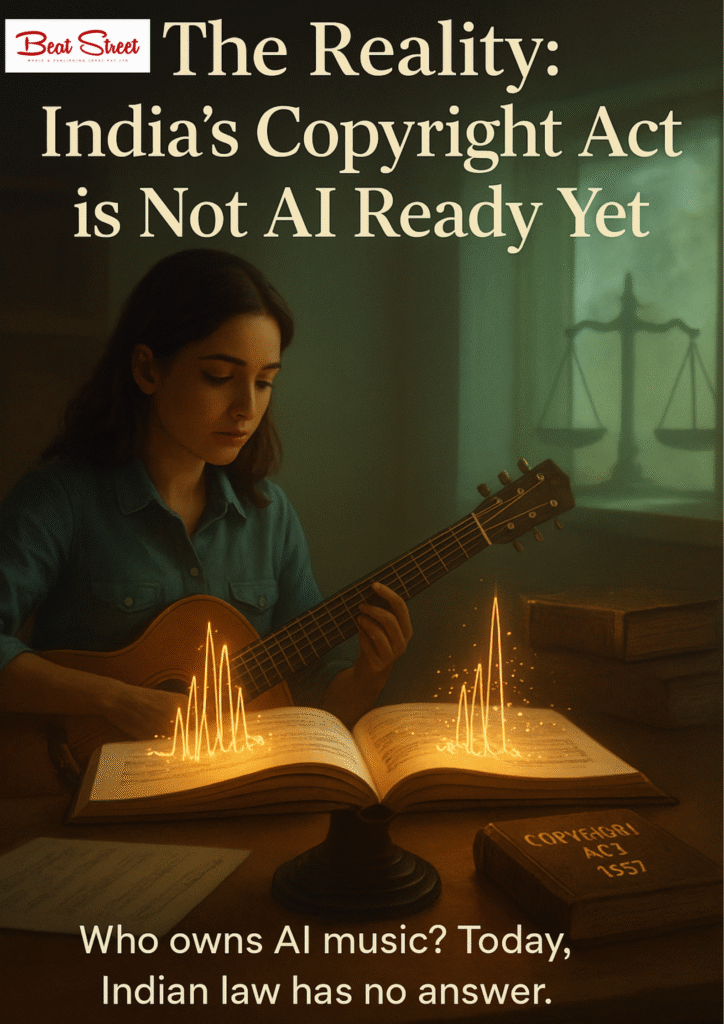Imagine you are a songwriter. Tomorrow you find an AI track on a platform that sounds almost like your last release. Who owns it? Who gets paid? Today, Indian copyright law has no answer.
India’s Copyright Act, 1957 was written for another time. Even with the big 2012 update that added digital protections, the law says nothing about artificial intelligence. This silence creates three big problems for the music world.

1. Authorship and Ownership
The law says the author is a person. Courts interpret this as a human or a company. Purely AI-generated works, with no human input, fall into the public domain. That means no copyright. Anyone can copy or use them. For creators and companies, this destroys value.
2. Training Data and Infringement
AI systems learn by scraping content. Your songs or lyrics may already be part of that data. But the law does not clarify if this is fair use or infringement. Rightsholders argue it is theft. AI companies say it is transformative. Until a court decides, it is a grey zone.
3. Liability and Transparency
What happens if an AI track copies your melody? Who is responsible? The developer? The user? The platform? No one knows. There is also no rule that forces AI companies to disclose their training data. Without transparency, creators are left in the dark.
Why There is Confusion
The government is sending mixed signals:
- Recent draft copyright rules only spoke about digital payments. They did not touch AI.
- A committee was formed in April 2025 to study the issue. Their report is not public yet.
- Ministers have said AI developers need permission to use copyrighted works. But this is policy talk, not law.
The big test case is ANI versus OpenAI, now in the Delhi High Court. The verdict could push the government to act. Until then, the law is unclear.
How India Compares Globally
- In the United States, copyright requires human authorship. Pure AI works cannot be protected. Clear but strict.
- In the European Union, the AI Act demands transparency and gives rightsholders the power to opt out. Strong focus on creator rights.
- In the United Kingdom, the law protects computer-generated works. It credits the person who arranged the creation. A progressive model.
- India sits in the middle. Ambiguous and waiting for reform.
What Might Happen Next
The committee will likely look at global models. Possible outcomes include:
- Adding a clear exception for text and data mining in research.
- Creating collective licensing or opt-out frameworks for training data.
- Distinguishing between AI-assisted works, which remain copyrightable, and AI-only works, which may not.
What This Means for You
Composers and lyricists should document their process. Show your human input when using AI tools.
Labels and publishers should start drafting contracts that address AI-created works.
Artists should not rely only on AI tracks for long-term value. They may not be protectable.
Tech companies should prepare for licensing systems. Change is coming.
Closing Thoughts
India’s talent is unmatched. The creator economy is growing fast. But unless the law keeps up with AI, the people who write, compose, and perform will lose value.
Right now the law is behind. The government is watching and waiting. For creators, this means living with uncertainty. For companies, it means planning ahead. For all of us, it means pushing for a balance between innovation and rights.
The next few months will decide if India leads or lags in protecting creativity in the age of AI.
Leave a Reply